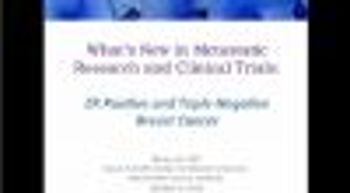
Researchers in Japan are beginning to construct patient-centered counseling techniques for breast cancer by evaluating patient preference.


Researchers in Japan are beginning to construct patient-centered counseling techniques for breast cancer by evaluating patient preference.

One major challenge in breast cancer is determining which treatment will be most effective for an individual patient's tumor. With a genetic panel, the TAXSig system may help change that.

A prognostic disease marker that often occurs in patients with triple-negative breast cancer may lead to development of a medication to close a therapeutic gap in targeted cancer treatment.


Regina, a licensed pharmacist for more than 20 years, developed breast cancer at 48 years of age.

A recent meta-analysis published in the journal Plos One indicates a potential link between breast cancer and use of a common blood pressure medication, but a closer look tells a different story.

Medicaid beneficiaries are more likely to be screened for 3 types of cancer in states where physicians receive higher payments for office visits, a study suggests.

Specialty therapies for rheumatoid arthritis, multiple sclerosis, and breast cancer tended to have positive functional and clinical outcomes for patients.

A phase 2 trial reported 100% 3-year overall survival rates with frontline therapy consisting of lenalidomide, bortezomib, and dexamethasone in younger patients with multiple myeloma.

More than 90% of women in the program received timely follow-up care.

In a study that has the potential to change public health recommendations for breast cancer screening, researchers have validated the value of mammography in older women.

More than 90% of women in the program received timely follow-up care.

Launch of premium-priced agents powering growth forecast.

Targeted therapies used in conjunction with chemotherapy may offer benefits to patients with triple-negative breast cancer.

A study indicates that BPA-induced cancers in female rats may lead to tumors with evidence of both genetic and epigenetic changes.

Study indicates hyperlipidaemia increases risk of breast cancer by 1.64 times.

People with high levels of sedentary behavior are more susceptible to 3 types of cancer.

Study finds cancer management guidelines need to be updated to account for patients with HIV.

In addition to finding no association between aspirin use and reduced risk of breast cancer, researchers find non-breast cancer deaths higher among aspirin users.

Patients treated for Hodgkin's disease during childhood or adolescence have a greater risk of developing secondary breast cancer later in life, particularly if they receive radiotherapy during puberty.

Researchers in the United Kingdom have identified a blood test for circulating free DNA that may help physicians predict whether or not a patient with breast cancer is likely to respond to an initial round of chemotherapy, enabling earlier initiation of alternate treatments.

Charles M. Perou, PhD, professor of genetics, pathology & laboratory medicine, UNC Lineberger Comprehensive Cancer Center, discusses a trial (CALGB 40601) presented at the 2014 ASCO Annual Meeting.

Nancy Lin, MD, of the Susan F. Smith Center for Women's Cancers at the Dana Farber Cancer Institute, discusses the differences between breast cancer subtypes and looks at recent drug approvals and research directions for the future.

This presentation by Carol DeSantis, MPH, an epidemiologist with the American Cancer Society (ACS), covers key findings and statistics from the ACS report "Breast Cancer Facts and Figures 2013-2014."
